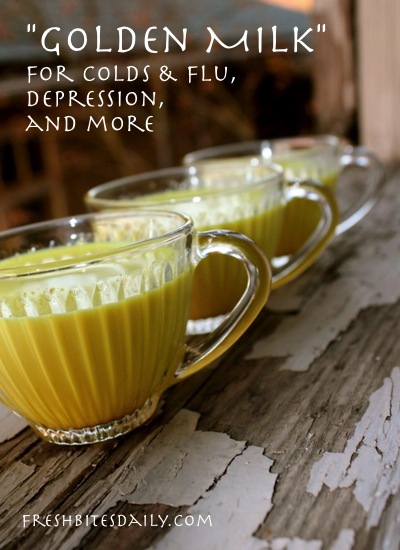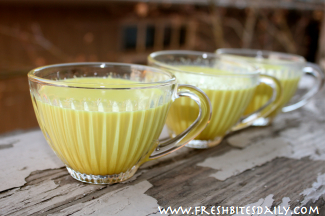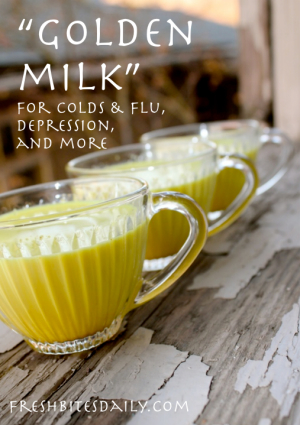
Turmeric is fast becoming a popular remedy for just about everything that ails you. I became an avid enthusiast on a trip to Kauai when I actually had access to the fresh root for the first time. I was recovering from a drastic dermatological procedure and it was not the optional sort — I had cheek skin grafted to my nose in the doctor’s effort to find a piece of my skin not invaded by basal cell skin cancer. (As an aside, if you drink this golden milk in the sun, be sure to wear a giant hat….) In any case, on that Kauai trip, I needed extra care and nourishment and this is one of the ways I took care of myself — experimenting with all things turmeric. When I returned home, I found that the golden milk drink is particularly powerful as a wintertime cold and flu remedy. I have added some to just about every tea I have put together this past season. Turmeric in milk is a great option as well. The flavor is pleasant and offers a change from the tea.
Is this drink bitter? Many people know that turmeric has a bitter bite and so this is a common question. I defer to my picky 12-year-old on the topic:
The other night I asked my son if he would like another cup of “golden milk.”
He responded, “Mama, I already helped myself to fourths and I’m full.”
He and my younger son, the Half Pint Hacks have more recently made a YouTube video with the secret to a flavorful, non-bitter golden milk. Watch it here:
Why Golden Milk – Turmeric Milk
Traditionally, golden milk/turmeric milk has been used for colds, congestion, headache, and sore throats. Turmeric is a depression-fighter as well. Adding more to our diets is one great brain building strategy. (I talk about such strategies, I call them “Good Day Strategies,” in a free email series here.)
Turmeric has strong anti-inflammatory and anti-oxidant properties, making it a promising complementary therapy for cancer-prevention. Just as examples, promising studies suggest that it fights cancer of the skin (Jee et al., 1998; Bush et al., 2001), breast (Mehta et al., 1997; Ramachandran and You, 1999; Simon et al., 1998; Verma et al., 1997; Choudhuri et al., 2002), colon (Hanif et al., 1997), and liver (Park et al., 2005), and prostate (Mukhopadhyay et al., 2001). It was the skin research that had my attention before that trip to Kauai and even had me running around here with an bright orange facial mask. (You can gawk here and speculate as to whether my face is still orange.)
Beyond the western research, there are centuries of tradition using turmeric to cure all that ails you. As you explore the topic yourself, Ayurveda and Unani systems of medicines in India have used turmeric in health and wellness since for as long as records even exist. Read a detailed article about turmeric on the Fresh Bites Daily website here.
Turmeric Milk, The Drink
Golden milk is extremely simple. I use the ginger for flavor but it fights the same sorts of ailments. It’s critical in this mix to mask the bitterness of the turmeric and it brings health benefits to boot.
If you have fresh turmeric or ginger, by all means use those but I definitely reuse them. I would tend to rinse them and use them in a new batch of tea. You could make more golden milk as well.
How to Make Your Own Golden Milk / Turmeric Milk

- Place 2 cups of milk in a saucepan over medium heat.
- Add 1 teaspoon dried turmeric (or one-half inch fresh turmeric thinly sliced or diced)
- Add 1 teaspoon dried ginger (or one-half inch fresh ginger thinly sliced or diced)
- Add a dash of black pepper.
- Stir well, especially if you are using the dried spices.
- Let the milk begin to simmer — small bubbles will form on the sides of the saucepan. Stir.
- Allow to heat for another minute or two being careful not to let the milk overheat. Continue to stir at this point to get better heat distribution and so that you don’t end up distracted in your kitchen and end up with boiled turmeric in your burner pans (*cough*).
- Turn off heat, cover, and allow the golden milk mixture to sit for ten minutes or so to improve the infusion.
- Strain the golden milk through a strainer if you have used fresh ingredients.
- Add honey, adjusting to taste.
- Serve your golden milk warm.
If you find your turmeric milk drink to be overly bitter, it may be because you haven’t let it simmer long enough. If you actually boil turmeric powder, it will be far less bitter. If you are using a dairy-based milk you dance a careful dance between getting it hot enough to reduce the bitterness and too hot to burn and scald.
With our turmeric obsession comes a number of popular posts besides this short recipe on golden milk.
- All about turmeric — uses, research, recipes, and more. Find it here.
- Turmeric tea made with fresh turmeric root and some simple flavor options to help it come alive. Find it here.
- Turmeric tea paste, a great option for making tea from the powder that is also portable and easily taken on the road. (You can also use it to make golden milk – turmeric milk.) Find it here.

Research Citations on Turmeric

Choudhuri, T., Pal, S., Agwarwal, M.L., Das, T. and Sa, G. (2002) Curcumin induces apoptosis in human breast cancer cells through p53-dependent Bax induction. FEBS Lett 512(1-3), 334-340.
Hanif, R., Qiao, L., Shiff, S.J. and Rigas, B. (1997) Curcumin, a natural plant phenolic food additive, inhibits cell proliferation and induces cell cycle changes in colon adenocarcinoma cell lines by a prostaglan-din-independent pathway. J Lab Clin Med 130(6), 576-584.
Jee, S.H., Shen, S.C., Tseng, C.R., Chiu, H.C. and Kuo, M.L. (1998) Curcumin induces a p53-dependent apoptosis in human basal cell carcinoma cells. J Invest Dermatol 111(4), 656-661.
Mehta, K., Pantazis, P., McQueen, T. and Aggarwal, B.B. (1997) Antiproliferative effect of curcumin (difer- uloylmethane) against human breast tumor cell lines. Anticancer Drugs 8(5), 470-81.
Mukhopadhyay, A., Bueso-Ramos, C., Chatterjee, D., Pantazis, P. and Aggarwal, B.B. (2001) Curcumin downregulates cell survival mechanisms in human prostate cancer cell lines. Oncogene 20(52): 7597-7609.
Park, S.D., Jung, J.H., Lee, H.W., Kwon, Y.M., Chung, K.H., Kim, M.G. and Kim, C.H. (2005) Zedoariae rhizoma and curcumin inhibits platelet-derived growth factor-induced proliferation of human hepatic myofibroblasts. Int Immunopharmacol 5(3), 555-569.
Ramachandran, C. and You, W. (1999) Differential sensitivity of human mammary epithelial and breast carcinoma cell lines to curcumin. Breast Cancer Res Treat 54(3), 269-278.
Simon, A., Allais, D.P., Duroux, J.L., Basly, J.P., Durand-Fontanier, S. and Delage, C. (1998) Inhibitory effect of curcuminoids on MCF-7 cell proliferation and structure-activity relationships. Cancer Lett 129(1), 111-116.
Original article and pictures take www.freshbitesdaily.com site
Комментариев нет:
Отправить комментарий